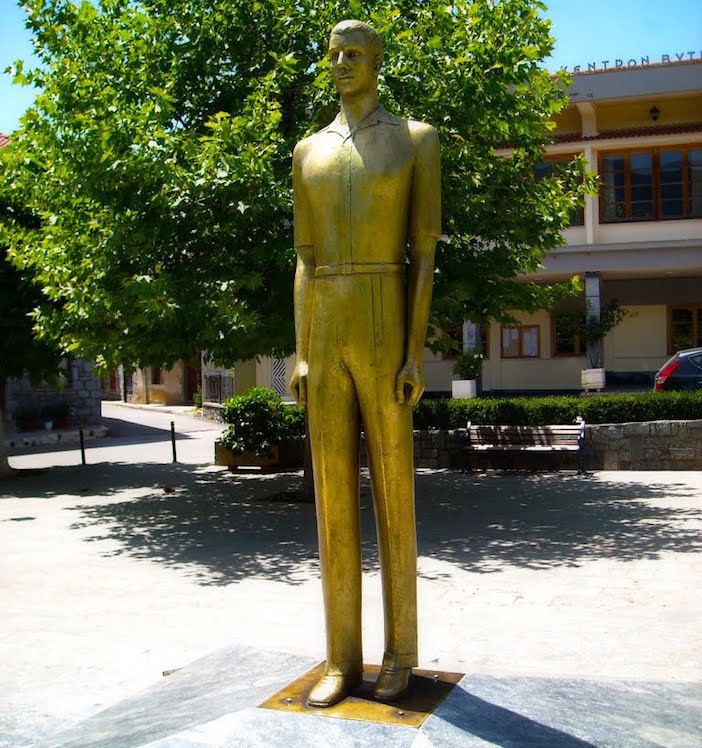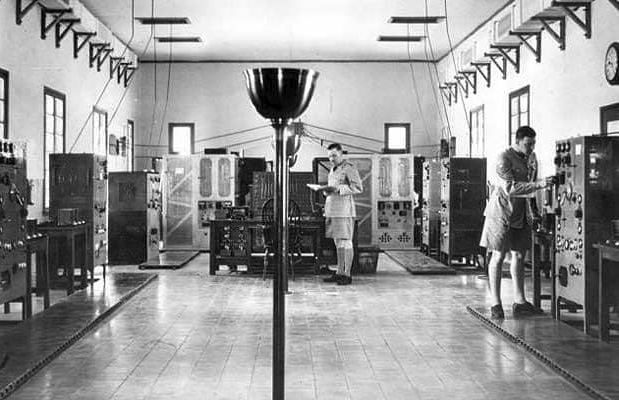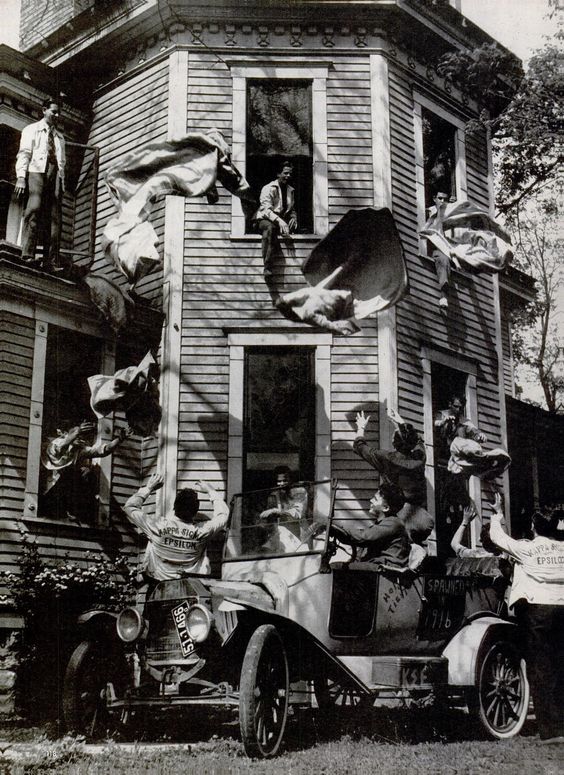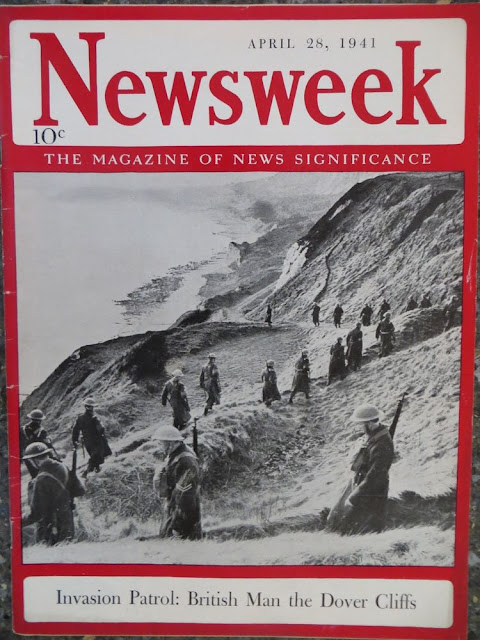Iraq War: Today, 2 May 1941, is generally considered the "start" of the Anglo-Iraq war, though the Iraqis have been increasingly hostile for the past week.
The Iraqis continue to shell the British airfield at Habbaniya, west of Baghdad, from a plateau to the south of the airfield. The Iraqis have 28 artillery pieces, but the Royal Air Force has complete control of the air despite the Iraqis having adequate planes. As the day opens, the Iraqis remain in a threatening posture, but British operations are not in any impinged or their forces really threatened - aside from the Iraqis controlling land routes between the isolated British garrisons.
The British decide enough is enough. They give the Iraqis a firm ultimatum to leave the area. The Iraqis refuse, so, before dawn, the British at Habbaniya make a sortie out of the perimeter. Using their lightly armed 80-100 old trainers, Gladiator fighters, and other obsolete aircraft, the RAF pilots support a battalion of the King's Own Royal Regiment (Lancaster), six companies of Assyrian Levies (Kurds), 18 armored cars and a company of RAF personnel. All told, the British have about 2,200 troops against the nearby Iraqi forces of about a division in size. Since the Iraqi government controls virtually the entire country, its forces potentially vastly outnumber the British - if they can bring them to bear.
The British objective is to give themselves some breathing room around Habbaniya and, if that goes well, restore land communications to their other bases. The air attack, timed to coincide with Muslim morning prayers, goes well, though Iraqi counterfire kills 13 and wounds 29 in Habbaniyah airbase, including civilians. The Iraqis immediately begin to fall back toward Fallujah. In addition to bombing Iraqi positions on the nearby plateau, the RAF raids the Iraqi airfield at Rashid airfield near Baghdad and destroy 22 planes on the ground at a cost of 5 of their own.
Mufti Amin al-Husseini declares jihad against the British "infidels." The Iraqi leader, Rashid el Gailani requests aid from Germany. The generals in Berlin basically shrug their shoulders due to the impossibility of sending help, but Hermann Goering is determined to provide assistance to Germany's allies in Iraq. He, along with the Italians, begins to send some planes that are crudely painted in Iraqi national markings. The Germans have no ground facilities for their aircraft in Iraq, however, as the British occupy all the airfields, and Iraq is far from the nearest Luftwaffe bases. These are daunting logistical issues, but it is the only form of assistance the Axis can send. The Arabs are willing Axis allies, and it is important for Germany to at least make a show of trying to help.
At Basra, the British seize oil installations. The situation in the port is very unsettled, with some guerrilla activity against the British, but so far the British there remain in control. Women and children (including travel writer Freya Stark) continue to seek refuge in the British embassy, many flown out of Habbaniya. In London, British Prime Minister Winston Churchill deliberates about what to do with the extremely important Iraqi oil wells and pipelines. The British continue sending reinforcements from India, with both troops and additional aircraft expected to arrive soon at the southern port of Basra and overland from Palestine.
European Air Operations: The RAF continues its missions against German shipping, today with 25 aircraft. It has some success today, sinking 321-ton German anti-submarine trawler Vp 808 (formerly the Reichsprasident Von Hindenburg) northwest of Borkum, Lower Saxony, and 2000 ton "Channel Stop" off Ostend.
After dark, RAF Bomber Command sends 95 planes against Hamburg and 17 against Emden.
The Luftwaffe also makes some sweeps over the North Sea. At 23:25, the Germans bomb and sink 1414-ton Norwegian collier Trajan (formerly the Doris). All 21 men aboard survive when picked up by destroyer and landed at Harwich, though some are injured. The wreck is located roughly a dozen miles northeast of Blakeneny, Norfolk.
The Luftwaffe continues its campaign against Liverpool after dark with 65 aircraft.
East African Campaign: The rainy season basically has halted operations for the time being. The Italians remain in their fortifications in the mountains near the Eritrean border under the command of the Duke of Aosta.
Battle of the Atlantic: U-201 comes across the wreck of the 8190-ton British tanker Capulet in the mid-Atlantic and sinks it. The Capulet has been adrift since being torpedoed on 28 April and already has been abandoned.
Royal Navy 286-ton minesweeping trawler HMT Alberic collides with destroyer St. Albans in Pentland Firth and sinks. There are 13 deaths. The St. Albans makes it to Southampton for repairs, which take a month.
Royal Navy 48 ton armed yacht HMY Nyula sinks in the Tyne after colliding with another ship.
Convoy OB 318 departs from Liverpool.
Battle of the Mediterranean: The Germans continue their attack at Tobruk in the Wadi Giadia sector. A dust storm seriously hampers operations, preventing General Rommel from making use of his panzers. A stalemate has developed, with the Germans fighting hard to expand their bridgehead (roughly 2 miles (3.2 km) along a 3 mile (4.8 km) front) through the Australian 9th Infantry Division perimeter. They have little success, and the Australians prepare to counterattack. However, the two sides are in a classic "clinch," and the outcome of the battle is far from certain. The Germans have occupied some high ground, but the Italian infantry has had difficulty overcoming surviving Australian garrisons in the rear. General Paulus, who has an overall command for the time being in North Africa, continues to grant General Rommel operational control, but he is growing increasingly leery of chances of success and tells Rommel not to press his attack home.
The Royal Navy has several different ways of resupplying Malta. Sometimes, a direct approach is taken, but at other times more covert operations are used. In the first such clandestine attempt, the 4702-ton British freighter Parracombe, disguised as a Spanish tramp steamer, hits a mine (some sources say it was sunk by Italian aircraft) off Cape Bon while trying to make a run past at night and sinks. This is part of Operation Temple, a convoy to resupply Malta with Hurricane fighters and other supplies. Along with everything else, 21 crated Hurricanes go to the bottom. There are 18 survivors from the 47-man crew, who are rescued by the Vichy French in Tunisia and interned at Bizerte.
The Royal Navy bombards Derna with the gunboat HMS Ladybird.
The Royal Navy begins operations to ferry troops from Mersa Matruh to Tobruk aboard destroyers HMS Decoy and Defender. The 2041-ton Greek steamer Virginia makes it to Tobruk with badly needed supplies. The Luftwaffe attacks, but the steamer quickly makes it in and out of the port without damage.
The Luftwaffe mines Alexandria Harbour, temporarily closing it to traffic. Alexandria is the Royal Navy's irreplaceable port in the eastern Mediterranean. It is reopened by sunset.
Luftwaffe incursions continue at Malta, but they are just fighter sweeps and reconnaissance today. Minesweeper Fermoy is hit while in drydock for maintenance and utterly destroyed.
Royal Navy destroyer HMS Jersey is returning from a sweep in search of Axis convoys to the Afrika Korps when it hits a mine dropped by the Luftwaffe at the entrance to Valletta Harbour in Malta and sinks. There are 35 deaths and an additional 48 wounded. The Luftwaffe has been successful in eliminating all Royal Navy minesweepers at Malta, making the waters treacherous. This incident causes the British immediately to transfer three warships (light cruiser Gloucester and destroyers Kashmir and Kipling) from Malta to Gibraltar rather than attempt to enter the harbor, which Jersey now blocks.
Hans-Joachim Marseille, now flying in Libya, is promoted to the rank of Unteroffizier.
German/Greek Relations: With Operation Marita successfully completed, the Wehrmacht tightens its control over the Greek mainland and occupies various villages and towns. As in Norway, Hitler authorizes that enemy soldiers be granted amnesty if they will surrender their weapons and go home. This process begins today.
Mathios Potagas, a 17-year-old from the village of Vytina in the Arcadia province of the Peloponnese, spots a Wehrmacht column approaching his village and decides to do something about it. He grabs his father's old hunting musket and opens fire from a ridge while shouting insults. The Germans quickly kill him. Potagas has become a legendary figure in the area, and there is a statue of him in the village square.
Anglo/US Relations: Another US Coast Guard cutter, the fifth, is transferred to the Royal Navy pursuant to Lend Lease. The USCGC Chelan becomes HMS Lulworth, named, as have been the previous transfers, for a Royal Navy coast guard station. The Royal Navy crews her with men from the battleship HMS Resolution, which is in New York for repairs.
Anglo/New Zealand Relations: New Zealand Prime Minister Peter Fraser is in Cairo, on his way to London for a visit. Churchill sends him a cable saying that "The successful defense of Crete is one of the most important factors in the defense of Egypt." New Zealand General Bernard Freyberg is in charge of Commonwealth forces there. Churchill notes that "an airborne attack" on Crete is expected "in the near future." Churchill, of course, does not mention that this very prescient intelligence is derived from reading German codes in the Ultra program.
US Military: Admiral Ernest J. King takes command of the US Atlantic Fleet. He remains subordinate to CINCPAC.
The US Navy begins an in-depth course in intelligence basics for naval officers. It will last for three weeks.
German Government: Hitler has fixed 22 June 1941 as the date for Operation Barbarossa, and there is extreme confidence within the German government that large swathes of Soviet territory will fall quickly. The real issue at this point is not military operations, but rather an exploitation of the soon-to-be conquered territories in the East. Accordingly, the government forms an Economic Staff to plan and administer this gargantuan task. This is the Oldenburg Plan, and its sole objective is to take out as much from the USSR as possible both to help the German economy and destroy the Soviet one. As the report states, "many millions of people will starve to death in Russia if we take out of the country the things necessary for us." This is not considered a bad thing or even anything of much consequence. This strain of thinking will persist throughout the war.
British Government: Churchill, who is in a foul mood because he has discovered that his wife has been using his honey in her garden, tours Plymouth.
Cyprus: The government begins evacuating civilians from cities to the countryside due to fears of Luftwaffe raids.
Holocaust: In Romania, the government sets up the National Center for Romanianization. This euphemistically titled organization primarily expropriates Jewish property for distribution to ethnic Romanians.
British Homefront: According to a poll reported in a Gallup survey printed in the News Chronicle, the British people favor retaliatory air raids on Germany - but only by a fairly close 53 - 38% margin, with 9% uncertain. Somewhat oddly, the people in heavily bombed areas are less likely to support such "vengeance" raids, with 76% supporting such raids in largely untouched North Riding/Cumberland/Westmorland areas, but only 45% in London. The further people are from the bombing, the more they approve of raids on Germany. This somewhat supports a pre-war thesis that terror bombing can destroy the will to resist, though different interpretations can be placed on such data.
American Homefront: The Federal Communications Commission (FCC) grants 10 stations commercial TV licenses, to take effect 1 July 1941. The television stations are to broadcast 15 hours per week with 525 lines and 30 frames per second. The first license is granted to W2XBS (WNBT), the second to W2XAB (WCBW). The experimental Dumont network already is on the air in New York City, but it is not granted a license in this first crop. These will be the only licenses granted until 2 May 1944 due to the outbreak of war involving the United States.
May 1941
May 1, 1941: British Hold Tobruk
The Iraqis continue to shell the British airfield at Habbaniya, west of Baghdad, from a plateau to the south of the airfield. The Iraqis have 28 artillery pieces, but the Royal Air Force has complete control of the air despite the Iraqis having adequate planes. As the day opens, the Iraqis remain in a threatening posture, but British operations are not in any impinged or their forces really threatened - aside from the Iraqis controlling land routes between the isolated British garrisons.
The British decide enough is enough. They give the Iraqis a firm ultimatum to leave the area. The Iraqis refuse, so, before dawn, the British at Habbaniya make a sortie out of the perimeter. Using their lightly armed 80-100 old trainers, Gladiator fighters, and other obsolete aircraft, the RAF pilots support a battalion of the King's Own Royal Regiment (Lancaster), six companies of Assyrian Levies (Kurds), 18 armored cars and a company of RAF personnel. All told, the British have about 2,200 troops against the nearby Iraqi forces of about a division in size. Since the Iraqi government controls virtually the entire country, its forces potentially vastly outnumber the British - if they can bring them to bear.
The British objective is to give themselves some breathing room around Habbaniya and, if that goes well, restore land communications to their other bases. The air attack, timed to coincide with Muslim morning prayers, goes well, though Iraqi counterfire kills 13 and wounds 29 in Habbaniyah airbase, including civilians. The Iraqis immediately begin to fall back toward Fallujah. In addition to bombing Iraqi positions on the nearby plateau, the RAF raids the Iraqi airfield at Rashid airfield near Baghdad and destroy 22 planes on the ground at a cost of 5 of their own.
Mufti Amin al-Husseini declares jihad against the British "infidels." The Iraqi leader, Rashid el Gailani requests aid from Germany. The generals in Berlin basically shrug their shoulders due to the impossibility of sending help, but Hermann Goering is determined to provide assistance to Germany's allies in Iraq. He, along with the Italians, begins to send some planes that are crudely painted in Iraqi national markings. The Germans have no ground facilities for their aircraft in Iraq, however, as the British occupy all the airfields, and Iraq is far from the nearest Luftwaffe bases. These are daunting logistical issues, but it is the only form of assistance the Axis can send. The Arabs are willing Axis allies, and it is important for Germany to at least make a show of trying to help.
At Basra, the British seize oil installations. The situation in the port is very unsettled, with some guerrilla activity against the British, but so far the British there remain in control. Women and children (including travel writer Freya Stark) continue to seek refuge in the British embassy, many flown out of Habbaniya. In London, British Prime Minister Winston Churchill deliberates about what to do with the extremely important Iraqi oil wells and pipelines. The British continue sending reinforcements from India, with both troops and additional aircraft expected to arrive soon at the southern port of Basra and overland from Palestine.
European Air Operations: The RAF continues its missions against German shipping, today with 25 aircraft. It has some success today, sinking 321-ton German anti-submarine trawler Vp 808 (formerly the Reichsprasident Von Hindenburg) northwest of Borkum, Lower Saxony, and 2000 ton "Channel Stop" off Ostend.
After dark, RAF Bomber Command sends 95 planes against Hamburg and 17 against Emden.
The Luftwaffe also makes some sweeps over the North Sea. At 23:25, the Germans bomb and sink 1414-ton Norwegian collier Trajan (formerly the Doris). All 21 men aboard survive when picked up by destroyer and landed at Harwich, though some are injured. The wreck is located roughly a dozen miles northeast of Blakeneny, Norfolk.
The Luftwaffe continues its campaign against Liverpool after dark with 65 aircraft.
 |
| Captured Italian material and equipment. This picture was taken on May 2, 1941, at Agordat, Eritrea. Guns were captured when the British Troops took Agordat. |
Battle of the Atlantic: U-201 comes across the wreck of the 8190-ton British tanker Capulet in the mid-Atlantic and sinks it. The Capulet has been adrift since being torpedoed on 28 April and already has been abandoned.
Royal Navy 286-ton minesweeping trawler HMT Alberic collides with destroyer St. Albans in Pentland Firth and sinks. There are 13 deaths. The St. Albans makes it to Southampton for repairs, which take a month.
Royal Navy 48 ton armed yacht HMY Nyula sinks in the Tyne after colliding with another ship.
Convoy OB 318 departs from Liverpool.
 |
| A Chinese sound detector - a forerunner of radar - in use at Chongqing, China, on May 2, 1941. This particular unit is being used to direct 3-inch anti-aircraft guns (AP Photo). |
The Royal Navy has several different ways of resupplying Malta. Sometimes, a direct approach is taken, but at other times more covert operations are used. In the first such clandestine attempt, the 4702-ton British freighter Parracombe, disguised as a Spanish tramp steamer, hits a mine (some sources say it was sunk by Italian aircraft) off Cape Bon while trying to make a run past at night and sinks. This is part of Operation Temple, a convoy to resupply Malta with Hurricane fighters and other supplies. Along with everything else, 21 crated Hurricanes go to the bottom. There are 18 survivors from the 47-man crew, who are rescued by the Vichy French in Tunisia and interned at Bizerte.
The Royal Navy bombards Derna with the gunboat HMS Ladybird.
The Royal Navy begins operations to ferry troops from Mersa Matruh to Tobruk aboard destroyers HMS Decoy and Defender. The 2041-ton Greek steamer Virginia makes it to Tobruk with badly needed supplies. The Luftwaffe attacks, but the steamer quickly makes it in and out of the port without damage.
The Luftwaffe mines Alexandria Harbour, temporarily closing it to traffic. Alexandria is the Royal Navy's irreplaceable port in the eastern Mediterranean. It is reopened by sunset.
Luftwaffe incursions continue at Malta, but they are just fighter sweeps and reconnaissance today. Minesweeper Fermoy is hit while in drydock for maintenance and utterly destroyed.
Royal Navy destroyer HMS Jersey is returning from a sweep in search of Axis convoys to the Afrika Korps when it hits a mine dropped by the Luftwaffe at the entrance to Valletta Harbour in Malta and sinks. There are 35 deaths and an additional 48 wounded. The Luftwaffe has been successful in eliminating all Royal Navy minesweepers at Malta, making the waters treacherous. This incident causes the British immediately to transfer three warships (light cruiser Gloucester and destroyers Kashmir and Kipling) from Malta to Gibraltar rather than attempt to enter the harbor, which Jersey now blocks.
Hans-Joachim Marseille, now flying in Libya, is promoted to the rank of Unteroffizier.
 |
| The statue to Mathios Potagas in Vytina, Greece. |
Mathios Potagas, a 17-year-old from the village of Vytina in the Arcadia province of the Peloponnese, spots a Wehrmacht column approaching his village and decides to do something about it. He grabs his father's old hunting musket and opens fire from a ridge while shouting insults. The Germans quickly kill him. Potagas has become a legendary figure in the area, and there is a statue of him in the village square.
Anglo/US Relations: Another US Coast Guard cutter, the fifth, is transferred to the Royal Navy pursuant to Lend Lease. The USCGC Chelan becomes HMS Lulworth, named, as have been the previous transfers, for a Royal Navy coast guard station. The Royal Navy crews her with men from the battleship HMS Resolution, which is in New York for repairs.
Anglo/New Zealand Relations: New Zealand Prime Minister Peter Fraser is in Cairo, on his way to London for a visit. Churchill sends him a cable saying that "The successful defense of Crete is one of the most important factors in the defense of Egypt." New Zealand General Bernard Freyberg is in charge of Commonwealth forces there. Churchill notes that "an airborne attack" on Crete is expected "in the near future." Churchill, of course, does not mention that this very prescient intelligence is derived from reading German codes in the Ultra program.
 |
| Grand Rapids, Michigan, 2 May 1941. |
The US Navy begins an in-depth course in intelligence basics for naval officers. It will last for three weeks.
German Government: Hitler has fixed 22 June 1941 as the date for Operation Barbarossa, and there is extreme confidence within the German government that large swathes of Soviet territory will fall quickly. The real issue at this point is not military operations, but rather an exploitation of the soon-to-be conquered territories in the East. Accordingly, the government forms an Economic Staff to plan and administer this gargantuan task. This is the Oldenburg Plan, and its sole objective is to take out as much from the USSR as possible both to help the German economy and destroy the Soviet one. As the report states, "many millions of people will starve to death in Russia if we take out of the country the things necessary for us." This is not considered a bad thing or even anything of much consequence. This strain of thinking will persist throughout the war.
British Government: Churchill, who is in a foul mood because he has discovered that his wife has been using his honey in her garden, tours Plymouth.
Cyprus: The government begins evacuating civilians from cities to the countryside due to fears of Luftwaffe raids.
Holocaust: In Romania, the government sets up the National Center for Romanianization. This euphemistically titled organization primarily expropriates Jewish property for distribution to ethnic Romanians.
 |
| May 2, 1941: "Franklin Delano Roosevelt Library, Hyde Park, New York. Exhibition hall." (Large-format negative by Gottscho-Schleisner). |
American Homefront: The Federal Communications Commission (FCC) grants 10 stations commercial TV licenses, to take effect 1 July 1941. The television stations are to broadcast 15 hours per week with 525 lines and 30 frames per second. The first license is granted to W2XBS (WNBT), the second to W2XAB (WCBW). The experimental Dumont network already is on the air in New York City, but it is not granted a license in this first crop. These will be the only licenses granted until 2 May 1944 due to the outbreak of war involving the United States.
 |
| The original WNBT test pattern. |
May 1941
May 1, 1941: British Hold Tobruk
May 3, 1941: Liverpool Hammered
May 4, 1941: Hitler Victory Speech
May 5, 1941: Patriots Day
May 6, 1941: Stalin In Command
May 7, 1941: May Blitz
May 8, 1941: Pinguin Sunk
May 9, 1941: U-110 Captured
May 10, 1941: Hess Flies Into History
May 11, 1941: The Hess Peace Plan
May 12, 1941: Tiger Arrives Safely
May 13, 1941: Keitel's Illegal Order
May 14, 1941: Holocaust in Paris
May 15, 1941: Operation Brevity
May 16, 1941: Blitz Ends
May 17, 1941: Habbaniya Relieved
May 18, 1941: Croatia Partitioned
May 19, 1941: Bismarck at Sea
May 20, 1941: Invasion of Crete
May 21, 1941: Robin Moore Sinking
May 22, 1941: Royal Navy Destruction Off Crete
May 23, 1941: Crete Must Be Won
May 24, 1941: Bismarck Sinks Hood
May 25, 1941: Lütjens' Brilliant Maneuver
May 26, 1941: Bismarck Stopped
May 27, 1941: Bismarck Sunk
May 28, 1941: Crete Lost
May 29, 1941: Royal Navy Mauled Off Crete
May 30, 1941: Sorge Warns, Stalin Ignores
May 31, 1941: British Take Baghdad
2020











